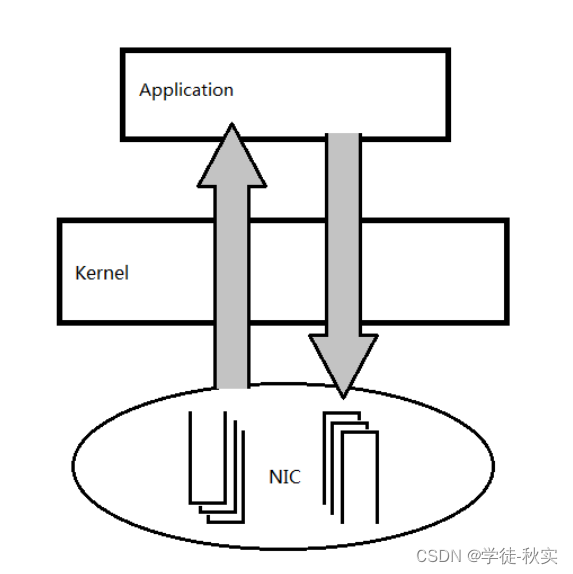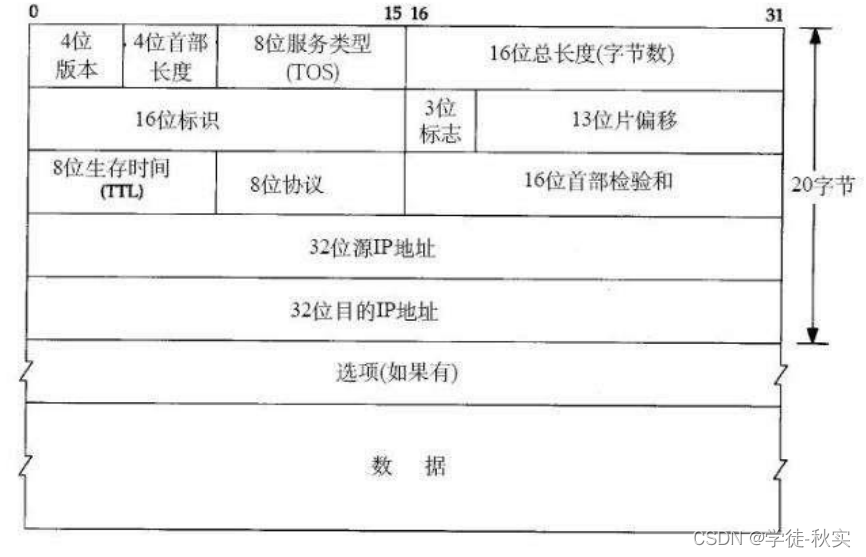如何实现用户态协议栈
前提:抓取到网卡接收发和发送的文件。
有三种方法
- 使用原生的socket套接字类型
- 使用Netmap框架
- 使用dpdk
这里使用Netmap框架来实现一个服务端对客户端数据接收并回发程序。
Netmap介绍
Netmap是一个高性能收发原始数据包的框架,包含了linux内核模块以及用户态的库函数。其目标是在不修改现有操作系统和不需特殊硬件支持的情况下,实现用户态和网卡数据包之间的高性能传递。如图。

Netmap常用接口
- nm_open:打开网卡设备,并创建nm_desc结构体。
- nm_mmap
- nm_nextpkt:用来接收网卡上到来的数据包
- nm_inject:用来发包
- nm_close:关闭
如何实现
我们抓到数据包都是以太网帧,需要一层一层解析出来。首先时定义协议结构体。
以太网头格式

struct ethhdr {
unsigned char h_dest[ETH_ALEN]; //目的MAC地址
unsigned char h_source[ETH_ALEN]; //源MAC地址
unsigned short h_proto; //类型
};
IP头格式

struct iphdr {
unsigned char version; //版本+首部长度
unsigned char tos; //服务类型
unsigned short tot_len; //总长度,
unsigned short id; //标识
unsigned short flag_off; //标志位和偏移
unsigned char ttl; //生命周期,经过一个网关就减一,直到为0返回不可达
unsigned char protocol; //返回协议
unsigned short check; //校验值
unsigned int saddr; //源IP
unsigned int daddr; //目的IP
};
UDP协议头

struct udphdr {
unsigned short source; //源端口
unsigned short dest; //目的端口
unsigned short len; //长度
unsigned short check; //校验值
};
一帧UDP报文
struct udppkt {
struct ethhdr eh; //以太网头
struct iphdr ip; //ip头
struct udphdr udp; //udp头
unsigned char body[0]; //消息体,使用零长数组,柔性数组
};
ARP协议头
struct arphdr {
unsigned short h_type;
unsigned short h_proto;
unsigned char h_addrlen;
unsigned char protolen;
unsigned short oper;
unsigned char smac[ETH_ALEN];
unsigned int sip;
unsigned char dmac[ETH_ALEN];
unsigned int dip;
};
struct arppkt {
struct ethhdr eh;
struct arphdr arp;
};
ICMP协议
struct icmphdr {
unsigned char type;
unsigned char code;
unsigned short check;
unsigned short identifier;
unsigned short seq;
unsigned char data[32];
};
struct icmppkt {
struct ethhdr eh;
struct iphdr ip;
struct icmphdr icmp;
};
代码实现
main
void print_mac(unsigned char *mac) {
int i = 0;
for (i = 0;i < ETH_ALEN-1;i ++) {
printf("%02x:", mac[i]);
}
printf("%02x", mac[i]);
}
void print_ip(unsigned char *ip) {
int i = 0;
for (i = 0;i < 3;i ++) {
printf("%d.", ip[i]);
}
printf("%d", ip[i]);
}
void print_arp(struct arppkt *arp) {
print_mac(arp->eh.h_dest);
printf(" ");
print_mac(arp->eh.h_source);
printf(" ");
printf("0x%04x ", ntohs(arp->eh.h_proto));
printf(" ");
}
int str2mac(char *mac, char *str) {
char *p = str;
unsigned char value = 0x0;
int i = 0;
while (p != '\0') {
if (*p == ':') {
mac[i++] = value;
value = 0x0;
} else {
unsigned char temp = *p;
if (temp <= '9' && temp >= '0') {
temp -= '0';
} else if (temp <= 'f' && temp >= 'a') {
temp -= 'a';
temp += 10;
} else if (temp <= 'F' && temp >= 'A') {
temp -= 'A';
temp += 10;
} else {
break;
}
value <<= 4;
value |= temp;
}
p ++;
}
mac[i] = value;
return 0;
}
void echo_arp_pkt(struct arppkt *arp, struct arppkt *arp_rt, char *hmac) {
memcpy(arp_rt, arp, sizeof(struct arppkt));
memcpy(arp_rt->eh.h_dest, arp->eh.h_source, ETH_ALEN);
str2mac(arp_rt->eh.h_source, hmac);
arp_rt->eh.h_proto = arp->eh.h_proto;
arp_rt->arp.h_addrlen = 6;
arp_rt->arp.protolen = 4;
arp_rt->arp.oper = htons(2);
str2mac(arp_rt->arp.smac, hmac);
arp_rt->arp.sip = arp->arp.dip;
memcpy(arp_rt->arp.dmac, arp->arp.smac, ETH_ALEN);
arp_rt->arp.dip = arp->arp.sip;
}
void echo_udp_pkt(struct udppkt *udp, struct udppkt *udp_rt) {
memcpy(udp_rt, udp, sizeof(struct udppkt));
memcpy(udp_rt->eh.h_dest, udp->eh.h_source, ETH_ALEN);
memcpy(udp_rt->eh.h_source, udp->eh.h_dest, ETH_ALEN);
udp_rt->ip.saddr = udp->ip.daddr;
udp_rt->ip.daddr = udp->ip.saddr;
udp_rt->udp.source = udp->udp.dest;
udp_rt->udp.dest = udp->udp.source;
}
unsigned short in_cksum(unsigned short *addr, int len)
{
register int nleft = len;
register unsigned short *w = addr;
register int sum = 0;
unsigned short answer = 0;
while (nleft > 1) {
sum += *w++;
nleft -= 2;
}
if (nleft == 1) {
*(u_char *)(&answer) = *(u_char *)w ;
sum += answer;
}
sum = (sum >> 16) + (sum & 0xffff);
sum += (sum >> 16);
answer = ~sum;
return (answer);
}
void echo_icmp_pkt(struct icmppkt *icmp, struct icmppkt *icmp_rt) {
memcpy(icmp_rt, icmp, sizeof(struct icmppkt));
icmp_rt->icmp.type = 0x0; //
icmp_rt->icmp.code = 0x0; //
icmp_rt->icmp.check = 0x0;
icmp_rt->ip.saddr = icmp->ip.daddr;
icmp_rt->ip.daddr = icmp->ip.saddr;
memcpy(icmp_rt->eh.h_dest, icmp->eh.h_source, ETH_ALEN);
memcpy(icmp_rt->eh.h_source, icmp->eh.h_dest, ETH_ALEN);
icmp_rt->icmp.check = in_cksum((unsigned short*)&icmp_rt->icmp, sizeof(struct icmphdr));
}
int main() {
struct ethhdr *eh;
struct pollfd pfd = {0};
struct nm_pkthdr h;
unsigned char *stream = NULL;
struct nm_desc *nmr = nm_open("netmap:eth0", NULL, 0, NULL);
if (nmr == NULL) {
return -1;
}
pfd.fd = nmr->fd;
pfd.events = POLLIN;
while (1) {
int ret = poll(&pfd, 1, -1);
if (ret < 0) continue;
if (pfd.revents & POLLIN) {
stream = nm_nextpkt(nmr, &h);
eh = (struct ethhdr*)stream;
if (ntohs(eh->h_proto) == PROTO_IP) {
struct udppkt *udp = (struct udppkt*)stream;
if (udp->ip.protocol == PROTO_UDP) {
struct in_addr addr;
addr.s_addr = udp->ip.saddr;
int udp_length = ntohs(udp->udp.len);
printf("%s:%d:length:%d, ip_len:%d --> ", inet_ntoa(addr), udp->udp.source,
udp_length, ntohs(udp->ip.tot_len));
udp->body[udp_length-8] = '\0';
printf("udp --> %s\n", udp->body);
#if 1
struct udppkt udp_rt;
echo_udp_pkt(udp, &udp_rt);
nm_inject(nmr, &udp_rt, sizeof(struct udppkt));
#endif
} else if (udp->ip.protocol == PROTO_ICMP) {
struct icmppkt *icmp = (struct icmppkt*)stream;
printf("icmp ---------- --> %d, %x\n", icmp->icmp.type, icmp->icmp.check);
if (icmp->icmp.type == 0x08) {
struct icmppkt icmp_rt = {0};
echo_icmp_pkt(icmp, &icmp_rt);
//printf("icmp check %x\n", icmp_rt.icmp.check);
nm_inject(nmr, &icmp_rt, sizeof(struct icmppkt));
}
} else if (udp->ip.protocol == PROTO_IGMP) {
} else {
printf("other ip packet");
}
} else if (ntohs(eh->h_proto) == PROTO_ARP) {
struct arppkt *arp = (struct arppkt *)stream;
struct arppkt arp_rt;
if (arp->arp.dip == inet_addr("192.168.0.123")) {
echo_arp_pkt(arp, &arp_rt, "00:50:56:33:1c:ca");
nm_inject(nmr, &arp_rt, sizeof(struct arppkt));
}
}
}
}
}